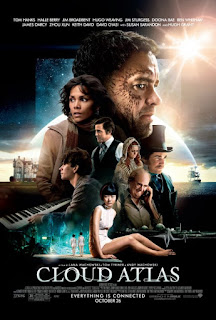Thursday, November 08, 2012
In Theaters: Cloud Atlas
Cynicism results when we don't see just consequences to our actions, when crimes go unpunished and good deeds seem to be in vain. Cloud Atlas, a staggering epic of multiple stories and people reborn in era after era, is about a lot of things, but I think it's mostly an argument against cynicism. It posits that all of our actions matter, that every gesture has some impact, if not in our lifetime, then in the next, and in ages afterward. But it's as much a work of pure cinema as a philosophical statement; working from the novel by David Mitchell, Tom Tykwer and Lily and Lana Wachowski have created a film that's wonderfully alive and agile. It's fun and surprisingly lightweight for a three-hour epic, a series of well-spun yarns that work on their own as well as together.
The film takes place across many different eras, featuring several stories that seem at first to be unrelated. In the mid-nineteenth century, a sick man (James Sturgess) travels across the Pacific under the care of an eccentric doctor (Tom Hanks) and makes friends with a runaway slave (David Gyasi). In England in the Thirties, a homosexual composer (Ben Whishaw) scribes the work of an aging master (Jim Broadbent) but is driven to compose his own symphony. In the Seventies, a reporter (Halle Berry) unravels a conspiracy surrounding the opening of a nuclear power plant. In modern-day Britain, a publisher (Broadbent) in trouble with gangsters seeks refuge in the Scottish countryside only to end up a prisoner in a nursing home. Centuries from now in Korea, a clone bred for service (Doona Bae) rebels against an authoritarian government. And in a farther, postapocalyptic future, a farmer (Hanks) haunted by a spirit embodying his cowardice and vice (Hugo Weaving) helps a scientist (Halle Berry) climb a forbidden mountain.
Tykwer and the Wachowskis traded off the various stories, but there aren't many signs of stylistic divergence, or obvious visual signifiers; rather the movie cuts between time segments on thematic or symbolic parallels, trusting us to work out where we are rather quickly. The effect is similar to D. W. Griffith's Intolerance, the film's most obvious ancestor; the principle of parallel action is taken to an extreme and we ride across time, space, and incident, guided by a larger internal rhythm. It sounds like a lot of work on the audience's part, but it's surprisingly easy to follow. The actors change radically in appearance between stories, and the settings are all different enough that a quick glance at the scenery usually suffices to orient the viewer.
So we're clearly going for an "everything is connected" kind of story, and the philosophy is anything but subtle, but the film doesn't feel like a dry schematic on which a plot was erected. A simple joy of storytelling pervades each segment on its own, with a consistent brisk pace and a feeling in each case that the fat has been trimmed. On a simple level we're getting several movies for the price of one, and without a 3-D surcharge. It really is a fun, energetic movie, never becoming ponderous because there's always another part of the story needing to be told.
But there's also a profundity and genuine beauty to the story as well, and its simple but brave assertion that all our actions have lasting consequences. The disconnect of seeing various actors in different roles throughout, at times in different ethnicities and even genders, makes the viewer wonder if these are the same people, reincarnated forever, or if it's simply calling attention to the permeability and ultimate uselessness of labels and dividers. It may take multiple viewings to see the many levels of connection that each story has, simply because the whole thing is so intricately constructed.
I'm not sure if "pure cinema" is the correct scholarly term to refer to something like Cloud Atlas, but it embraces the energy and possibility of the moving image more wholeheartedly than anything else I've seen this year. It's dynamic filmmaking, rich and complex but also fast, engaging, and visually spectacular. It leaps, skips from humor to tragedy, from melodrama to simple conversation, and crosses eons in an eyeblink, all to try and convince us that our actions have meaning that we cannot see. Our crimes and our good works both echo through time, it says. And it's hard not to feel emboldened by that.
Based on the novel by David Mitchell
Written and directed by Tom Tykwer, Lily Wachowski, and Lana Wachowski
Grade: A
Labels:
In Theaters,
Movies
Subscribe to:
Post Comments (Atom)

No comments:
Post a Comment